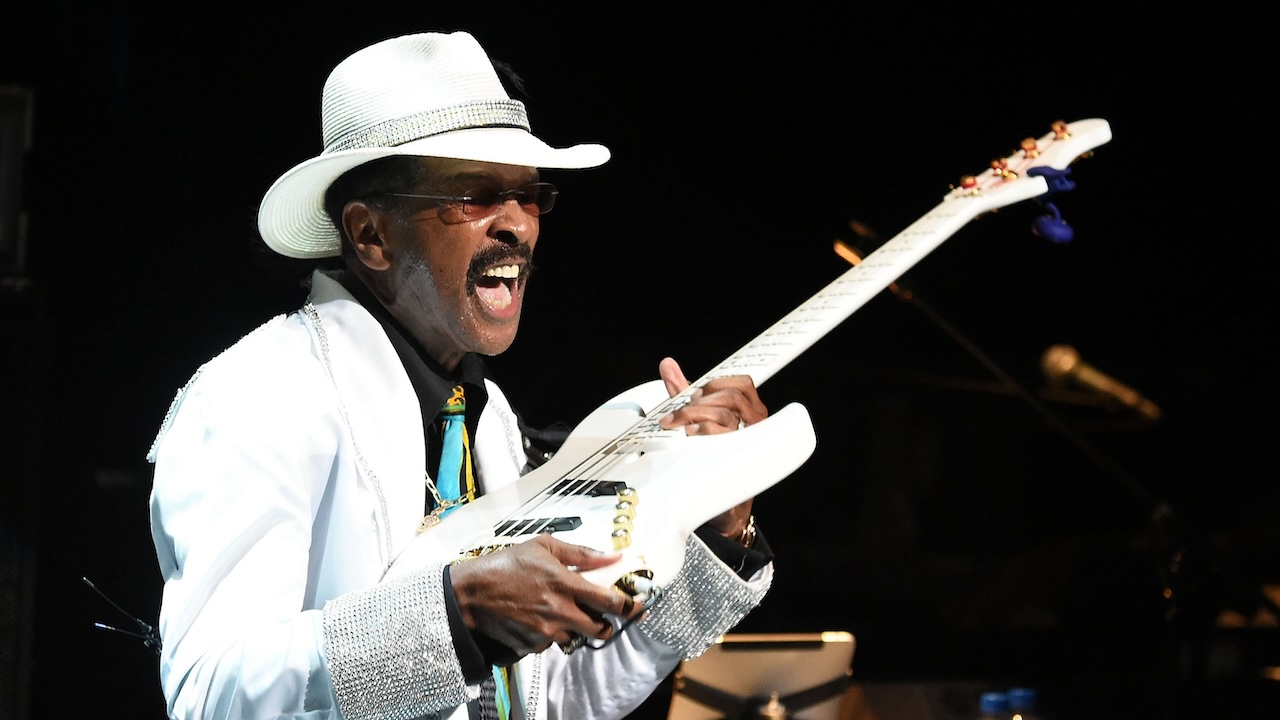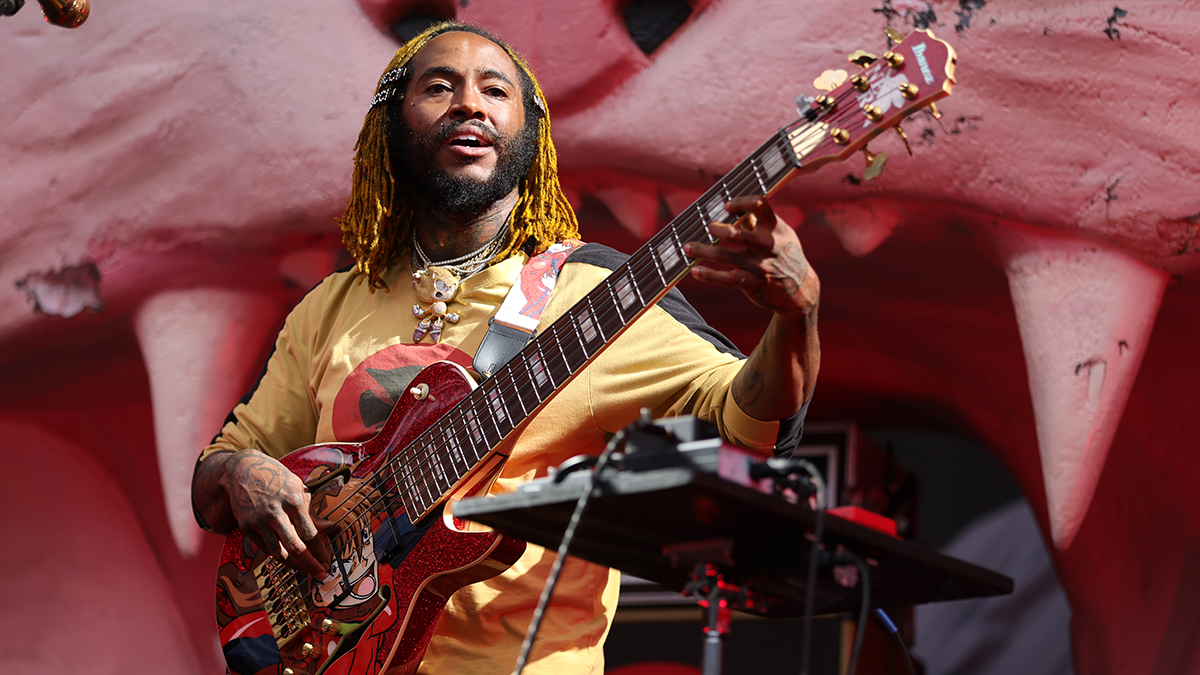“I wasn’t interested in learning the ‘correct’ style of playing bass. I was going back to guitar”: Larry Graham explains how his unorthodox six-string style invented slap bass
How the father of slap bass drove the world’s grooviest band

All the latest guitar news, interviews, lessons, reviews, deals and more, direct to your inbox!
You are now subscribed
Your newsletter sign-up was successful
Bassists like Larry Graham come around maybe once a century. Widely credited as the man who invented thumping and plucking, or slap bass if you prefer, he switched to bass from guitar and famously began to thump the strings while playing in his mother's band as a teenager.
Joining Sly & The Family Stone in 1967, Graham made his new style the defining sound of funk. No group before or since – with the possible exception of Prince – had such success in crossing funk grooves and pop melodies the way Sly and his band did on tracks such as Stand! and Dance to the Music.
“Dance to the Music stands out as one of my favorite basslines,” Graham told Bass Player. “Bass players weren't using effects up until that point, and that opened the door. Everyday People is also unique because I'm just thumpin' one note with the same rhythm for the whole song. I'd never heard that before.”
Graham has rarely strayed far from the limelight since he left the Family fold in 1972. His band Graham Central Station reeled off a string of bass-driven albums for the remainder of the '70s, with thump-led tunes like Hair and The Jam.
His vocal-oriented solo material made him a star all over again in the '80s, with ballads like One in a Million You and Just Be My Lady. “One in a Million You was my biggest record. For the first time in my career the focus was more on my vocals, so it kind of overshadowed my bass playing.”
When we met with the elder statesmen of funk bass in May 2007, he had just returned from a Graham Central Station engagement at Prince's Club 3121.
What were you doing just before you joined the Family Stone?
All the latest guitar news, interviews, lessons, reviews, deals and more, direct to your inbox!
“I went straight from playing with my mother to Sly. We were playing at Relax With Yvonne near the corner of Haight and Ashbury when Sly came and told me about this band he was starting. I went to a rehearsal at Sly's house, and we all hit it off right from the jump. He was originally going to be the bass player, but he jumped to keyboards, and we started playing gigs around the Bay.”
Had you always been thumpin' and pluckin'?
“I started from the first time I played bass. I played guitar with my fingers – not a pick. So I would thump the strings with my thumb to make up for the bass drum, and pluck the strings with my fingers to make up for the snare drum.
“It made sense to me because l had been a drummer at school. I wasn't interested in learning the so-called ‘correct’ style of playing bass guitar, because in my head I was going back to guitar. Then I realized, ‘Hey – this is pretty cool.’”
How did you and Greg Errico work together in the Family Stone rhythm section?
“Fortunately, Greg had a drumming style that really complemented what I was doing. We never had any collisions. It wouldn't have worked if he filled up a lot of space, which is what everybody else was doing at the time. He found a way to complement the song and the bassline by being creative and open.”
Can you describe how you both approached the beat in terms of feel?
“Greg plays on the money; he doesn't rush or lag. I can do that, but I can also lay back, depending on the song. You can hear me deliberately laying back on Just Like a Baby, Que Sera, Sera, and Sex Machine. Thank You (Falettinme Be Mice Elf Again) had to be on the money because the bassline sets the pattern.”
How did you record your lines?
"A lot of stuff was cut live, so we mic’d the amp in the control room and run a direct line as well. The most important thing was making it sound right in the room by capturing what was coming out of the instrument, strings, pedals, and amp – like a concert – as opposed to trying to create something different.”
How were the arrangements created?
“One of the elements that contributed to our success was that folks were allowed freedom of expression to a great degree. Sly would lay out the song and the pattern – the basic course that we were to follow – but everyone was allowed to contribute, especially the rhythm section.”
Did you ever write lyrics or share a songwriting credit?
“Nobody else in the band is credited with writing or co-writing any of the songs, although by today's standards some would probably be credited differently. We're making no claims or complaining about credit. I'm happy for the success we had, and that it proved to be a springboard for me.”
What were the circumstances when you left the Family Stone in 1972?
“Sometimes in a family, it comes time to go. Nothing is specifically wrong; at some point you leave home, and you aren't mad. You still love your parents and your brothers and sisters, but you leave. Everything is still cool.”
What was it like to assume the reins in Graham Central Station?
“My mother and Sly were both great bandleaders, and I learned from them. Sly & the Family Stone was an appropriate name because the whole band ran like a family unit. You always felt secure and protected, and that the direction given was reliable. I brought that vibe to my band, and it reflected in the music.”
Were you able to do more of the things you wanted on bass?
“I was able to feature my bass more, and my singing, too. In Sly & the Family Stone I mostly sang parts, but with Graham Central Station I sang a lot of lead.”
Did your bass approach change at all due to increased songwriting, vocals, and showmanship duties?
“I changed more as a singer, especially by the time we got to One in a Million You. Some folks didn't know my funky history with Sly & the Family Stone and GCS. Seeing me walk onstage with a bass was a surprise to the suit-and-tie crowd that started showing up at concerts. I'd go from One in a Million You to The Jam, and they were like, ‘Oh, that guy!’”


